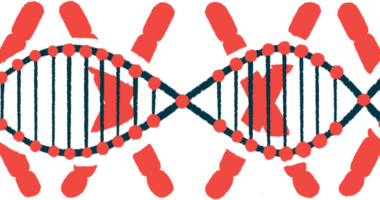Sarepta and Invitae Join to Speed Diagnosis of Duchenne Patients, Advance Trials of Potential Therapies
by |

Sarepta Therapeutics and Invitae, a company specializing in genetic diagnostics, are expanding a partnership to help clinicians more quickly identify people with Duchenne muscular dystrophy (DMD).
Sarepta is working to advance a number of potential — and an approved — disease-modifying treatments for DMD in a series of clinical trials.
“Our partnership with Invitae is important to advancing our clinical study objectives across our entire RNA-based platform,” Doug Ingram, Sarepta’s president and chief executive officer, said in a press release. “Sarepta’s goal is to treat 100% of eligible individuals with DMD and using the best tools to enable earlier genetic-based identification of patients is a necessary element to eventually achieving that aspiration.”
The partnership will also build on Invitae’s network of partnerships that connect patients and clinicians to treatment and research.
Sarepta is currently recruiting patients for the following clinical trials:
- A Phase 1 trial (NCT03375255) evaluating the safety, tolerability and pharmacokinetics (movement of drug’s within the body) of five escalating doses of SRP-5051 in Duchenne patients amenable to exon 51 skipping. It is recruiting at seven U.S. sites.
- A Phase 2 trial (NCT03218995), taking place in Europe, evaluating the safety, tolerability, pharmacokinetics and efficacy of escalating doses of Exondys 51 (eteplirsen) given once-weekly via intravenous infusions in 12 Duchenne infants and toddlers (ages six months to 48 months) who have a deletion mutation amenable to exon 51 skipping.
- A Phase 3 trial (NCT02500381) evaluating disease biomarkers, as well as the safety, pharmacokinetics and efficacy of SRP-4045 and SRP-4053 compared to placebo in Duchenne patients with out-of-frame deletion mutations amenable to exon 45 and exon 53 skipping. This study is recruiting about 125 children, ages 7 to 13, at sites across the U.S., Europe, Canada and Israel.
Other trials underway but not recruiting are:
- A Phase 1/2 trial (NCT02310906) assessing the safety, tolerability, efficacy and pharmacokinetics of SRP-4053 in Duchenne patients who have deletions amenable to exon 53 skipping. It is due to conclude in June 2019.
- A Phase 1/2 trial (NCT02530905) assessing the safety, tolerability and pharmacokinetics of SRP-4045 in patients with limited or no ability to walk (advanced-stage disease) who have deletions amenable to exon 45 skipping.
- A Phase 2 trial (NCT02420379) evaluating the safety, tolerability, efficacy and pharmacokinetics of Exondys 51 (eteplirsen) in early-stage patients amenable to exon 51 skipping.
- A long-term Phase 3 trial (NCT02255552) designed to provide confirmatory evidence of Exondys 51 (eteplirsen)’s effectiveness in Duchenne patients amenable to exon 51 skipping, as well as to evaluate safety and disease biomarkers.
Exon-skipping therapies work by “skipping over” a mutated exon in the dystrophin gene — exons being gene regions containing the information for protein production — so that functional, if lower, amounts of the dystrophin protein essential to muscle cells will be produced.
“Genetic information is a powerful tool that can improve healthcare for patients and their families, both by helping make quicker diagnoses of rare diseases and also by providing access to treatment options and research opportunities that rely on patients and their providers having their genetic information,” Robert Nussbaum, MD, chief medical officer at Invitae, said in the release. “Our network is designed to make it easier for patients and researchers to connect with each other.”







